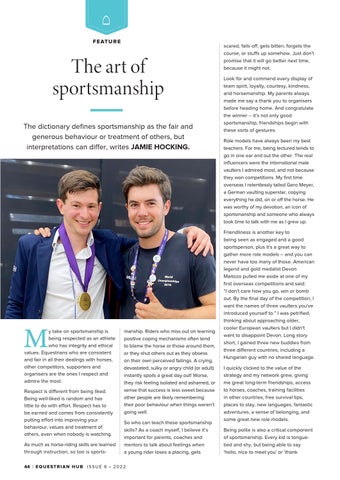F E AT U R E
The art of sportsmanship The dictionary defines sportsmanship as the fair and generous behaviour or treatment of others, but interpretations can differ, writes JAMIE HOCKING.
M
y take on sportsmanship is being respected as an athlete who has integrity and ethical values. Equestrians who are consistent and fair in all their dealings with horses, other competitors, supporters and organisers are the ones I respect and admire the most. Respect is different from being liked. Being well-liked is random and has little to do with effort. Respect has to be earned and comes from consistently putting effort into improving your behaviour, values and treatment of others, even when nobody is watching. As much as horse-riding skills are learned through instruction, so too is sports-
manship. Riders who miss out on learning positive coping mechanisms often tend to blame the horse or those around them, or they shut others out as they obsess on their own perceived failings. A crying, devastated, sulky or angry child (or adult) instantly spoils a great day out! Worse, they risk feeling isolated and ashamed, or sense that success is less sweet because other people are likely remembering their poor behaviour when things weren’t going well. So who can teach these sportsmanship skills? As a coach myself, I believe it’s important for parents, coaches and mentors to talk about feelings when a young rider loses a placing, gets
44 | E Q U E S T R I A N H U B I S S U E 6 • 2 0 2 2
scared, falls off, gets bitten, forgets the course, or stuffs up somehow. Just don't promise that it will go better next time, because it might not. Look for and commend every display of team spirit, loyalty, courtesy, kindness, and horsemanship. My parents always made me say a thank you to organisers before heading home. And congratulate the winner – it’s not only good sportsmanship, friendships begin with these sorts of gestures. Role models have always been my best teachers. For me, being lectured tends to go in one ear and out the other. The real influencers were the international male vaulters I admired most, and not because they won competitions. My first time overseas I relentlessly tailed Gero Meyer, a German vaulting superstar, copying everything he did, on or off the horse. He was worthy of my devotion, an icon of sportsmanship and someone who always took time to talk with me as I grew up. Friendliness is another key to being seen as engaged and a good sportsperson, plus it's a great way to gather more role models – and you can never have too many of those. American legend and gold medalist Devon Maitozo pulled me aside at one of my first overseas competitions and said: “I don't care how you go, win or bomb out. By the final day of the competition, I want the names of three vaulters you've introduced yourself to.” I was petrified, thinking about approaching older, cooler European vaulters but I didn't want to disappoint Devon. Long story short, I gained three new buddies from three different countries, including a Hungarian guy with no shared language. I quickly clicked to the value of the strategy and my network grew, giving me great long-term friendships, access to horses, coaches, training facilities in other countries, free survival tips, places to stay, new languages, fantastic adventures, a sense of belonging, and some great new role models. Being polite is also a critical component of sportsmanship. Every kid is tonguetied and shy, but being able to say 'hello, nice to meet you' or 'thank
























